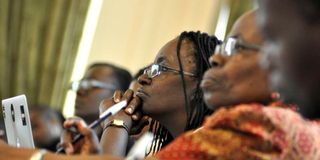Media has big role in gender equality effort

Media personalities during an Amwik forum on the two-third gender rule. The media play a big role in ensuring gender mainstreaming.
Gender inequality is a huge challenge despite efforts by the government and non-governmental organisations to push for equality. The Constitution advocates inclusivity in public office and other engagements but there’s a long way to go.
Gender mainstreaming is important for any state as it ensures inclusivity of all persons in matters of national development. It ensures that policymaking and legislative work is of higher quality as everybody is equally involved. It gives an opportunity to the citizens to give ideas for policies that respond effectively to their needs, easing adoption as they are embraced.
The media play a big role in ensuring gender mainstreaming. The manner in which communication content is packaged will determine how the society perceives the genders.
This is brought out clearly by how the media stereotypes genders. The media is a powerful tool in shaping perceptions. If it portrays equality between men and women, the audience’s perception of gender will be inclined towards equity.
Present both genders
Media houses should ensure that both genders are presented in their programmes, whether video, audio or print. We often see local television stations host only men on talk shows to discuss topical issues.
Media houses have claimed that, unlike men, women don’t always honour their invitations, mainly citing their unavailability for the programmes hosted early in the morning or late at night. But that is not a sufficient reason to have an all-only male talk show.
When recording audio, present female voices in male roles and vice versa as this would aid in deconstructing stereotypes and gender norms.
It is, therefore, important for governments to ensure media houses put out content that is not gender-biased, through inclusivity. Communicators should also practise the principles of gender-sensitive communication in their activities, which will support gender mainstreaming.
Ms Mwanja is a women’s rights defender and public relations and communications professional. @GraceMwanja





